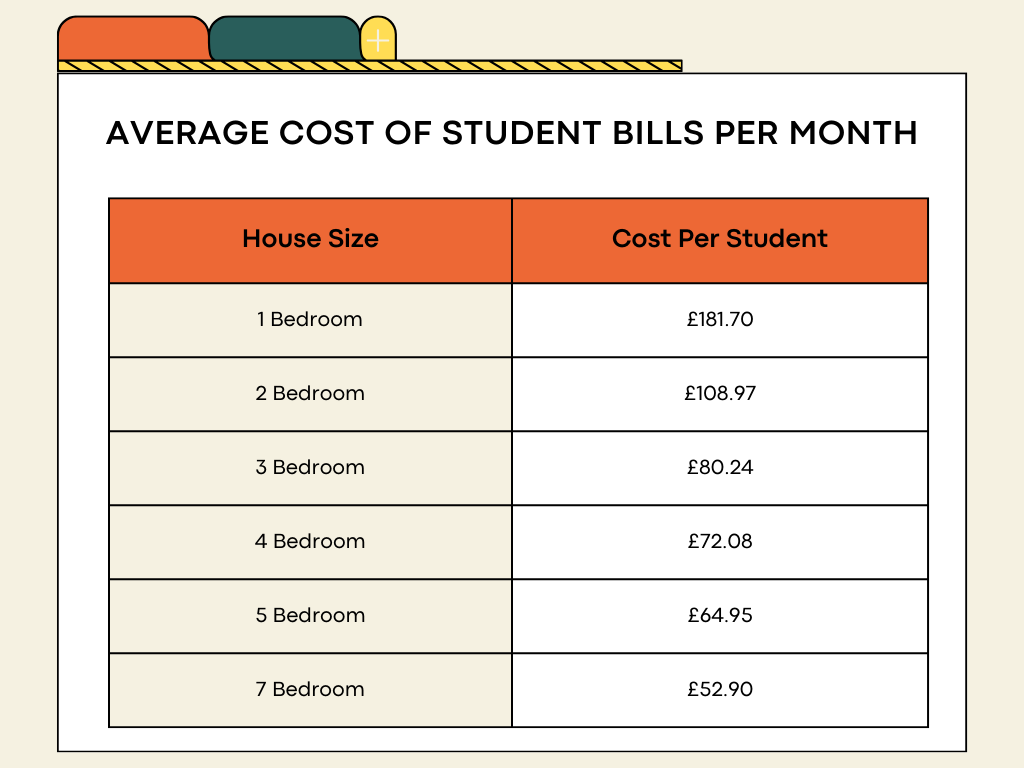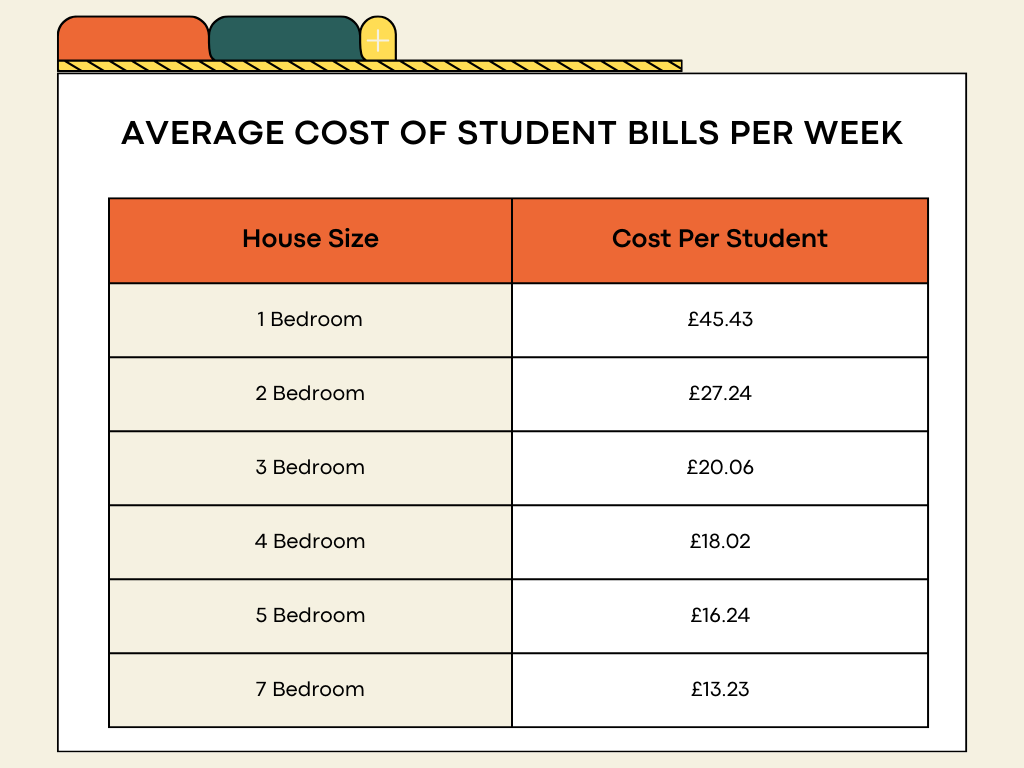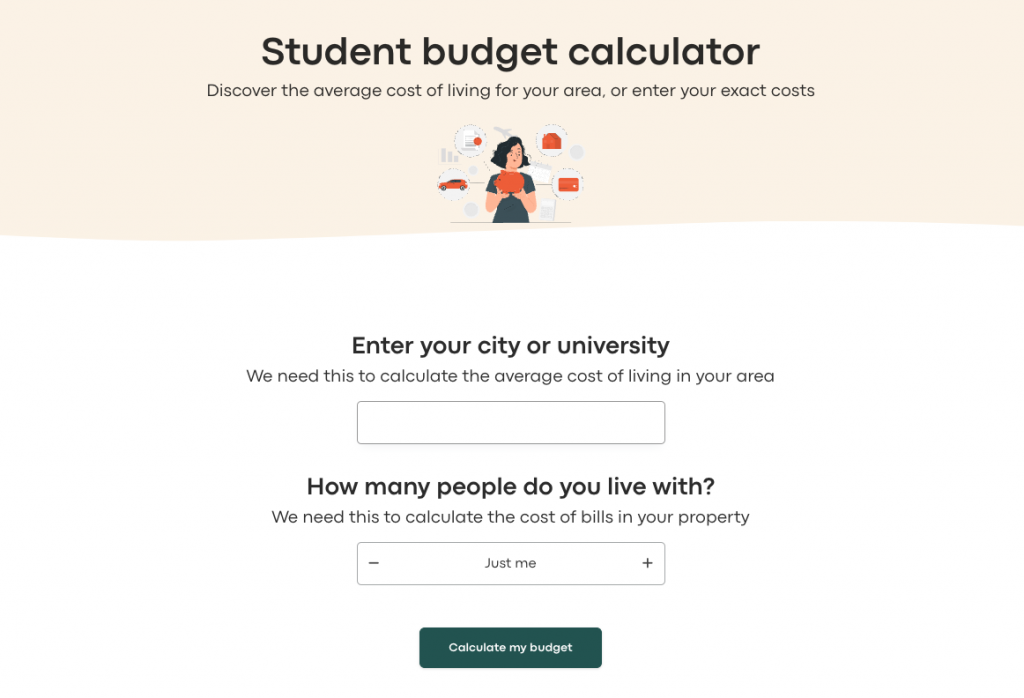 - minute read
- minute read

Moving to university is undoubtedly exciting, but what isn’t so thrilling is the prospect of being responsible for several different bills, including gas, electricity, water, broadband and the TV licence. Here, we’ve broken down each of these bills and how much students can expect to pay for them, depending on the size of the house/flat they’re living in.
We’ve started by showing the average amount UK students pay across all of their bills per month. These include utilities (gas and electricity), water, broadband and TV licence. As more students live in the same house, the cheaper bills become for each student. There are a few reasons for this, such as being able to split the cost of gas when heating is needed to warm up an entire house. The TV licence is also paid on a household basis, meaning the price remains the same, regardless of how many other students you’re living with.

A student living by themselves in a 1 bedroom house will pay an average of £181.70 a month on bills, whereas a student in a 7 bedroom house will pay an average of just £52.90 a month – a pretty big difference of £128.80!
Next up, we’ve broken down these total costs of student bills on a weekly basis. Just like with monthly costs, the table below shows that houses with more bedrooms become cheaper for each student. A student living by themselves in a 1 bedroom house will pay an average of £45.43 a week, whereas a student living in a 7 bedroom house will pay an average of £13.23 – which is £32.20 cheaper!

As a student, there are many other things you need to think about when it comes to budgeting each month. The average grocery shop a student pays each month is £194. To reduce this amount, you could shop with your housemates and cook meals together.
The average cost of rent will vary depending on what area of the UK you are living in. According to the National Student Accommodation Survey, the average rent students are paying is £550 per month. In London, students will pay on average £778 per month.
So if we add these totals together, we get £683. Now, if we add that to the average rental house size (a 3 bedroom property), your total monthly student bills could be £827. In London this would be £1,054.
Bare in mind this doesn’t take into account eating out, socialising and any other monthly payments such as a phone bill, transport and subscription services like Amazon and Netflix. To factor in these items, head to our student budget calculator.

Unless you’re living in all-inclusive student halls or bills-included private student housing, you’ll be responsible for managing and paying your energy bills. Aside from rent, these are the biggest monthly expense for most students. Depending on how many other people you live with, you can expect gas and electricity to set you back around £50 per month. This is due to the energy crisis which has caused the price of energy to skyrocket over the last few years. Gas and electricity can either be paid separately or as a dual fuel bill. Doing this doesn’t tend to be much cheaper, but is more convenient and time-saving.
There are a couple of factors that can affect the price of energy bills for students, such as how many people you live with, whereabouts in the UK you live and what time of year it is (you’ll pay more to stay warm in the winter months).
Below, we’ve listed the prices of utility bills on a monthly and weekly basis. These prices are listed per household as most students will make these payments together.
Energy prices become higher in larger households but per student, they do still shrink. For example, the average monthly dual fuel cost in a 2 bedroom house is £91, or £45.50 per student. In a 7 bedroom house, the average monthly cost of £210 becomes just £30 per student.
Similarly, the cost of gas and electricity becomes less per student in houses containing more bedrooms. For a pair of students living in a 2 bedroom house, they’ll pay around £10.57 a week on a dual fuel utility deal. For students in a 7 bedroom house, they’ll pay an average of £7.07 a week.
Water bills work a little differently. Unlike gas and electricity, you can’t switch providers with water. This is because water is provided by a fixed regional supplier. Your payment method will depend on whether your supply is metered or tariffed. When it comes to students, landlords tend to prefer standard tariffs.
These figures come from Thames Water and are based on a fixed tariff estimate. Just like with utilities, water bills become cheaper per person, the more people are living in the same home.
Using the 4 bedroom house size as an example, this would set a student back around £8 per month. For a student living by themselves, they’ll be paying £25 a month, meaning a pretty noticeable gap of £17 each month (or £204 across a year).
Student broadband is another essential university bill in private housing. It’s fairly common for an internet provider to already be in place when you move in. If so, then you should check who the provider is and how much is being paid.
If you’re living in a house with three or more people then we’d recommend looking at fibre-optic broadband, as this’ll be more than enough for everyone to use the internet without interruption (including streaming sites like Netflix). What’s more, when the cost is split between everyone, it shouldn’t cost more than £5 to £15 a month each.
The average 12 month contract for fibre optic broadband from the top 5 broadband providers is £576 a year or £48 a month per household. So in a 4 student house, this’ll work out as around £12 a month. If you don’t think your internet usage will justify this cost, then there are plenty of cheaper options available.
Most providers require you to sign-up for minimum 12-month contracts, meaning you’ll probably still be paying for broadband when you’ve moved out which is a bit of a pain. Resooma Bills set up Wi-Fi contracts that are tailored to your tenancy from a minimum of just 3 months. Plus, if your move in date is soon, Resooma can send out a FREE 5G Wi-Fi dongle to help get you connected to the internet quicker!
When it comes to cost, the TV licence is about as simple as it gets. Right now, a TV licence costs £169.50 for a household. So if you’re living in a household with 4 students, then this colour licence would cost you £42.38 each for a whole year.
Every household that watches or records live TV programmes on any channel, or downloads /watches any BBC programmes on iPlayer needs a TV licence. Check out our guide to learn more about student TV licences.
Resooma Bills bundles all of your student bills into one easy payment, including utilities, Wi-Fi and TV. We then equally split bills between you and your housemates, so there’s no need to worry about any awkward bill chats. Let us handle the stress, while you enjoy your time as a student!
Rather than have multiple direct debits leaving your account each month, you’ll have just one bill to pay, with each housemate being responsible for their share. Managing bills can feel like a daunting task before you arrive at university, which is where our student bill packages come in useful.
You can also follow our handy energy-saving tips to try and cut down on your energy bill going forward.



All your utility bills in one monthly payment, split between housemates
Get a quote


All your utility bills in one monthly payment, split between housemates
Get a quoteFinding his article helpful? We’ve got plenty more helpful articles on there way. Join our Savvy Sunday mailing list